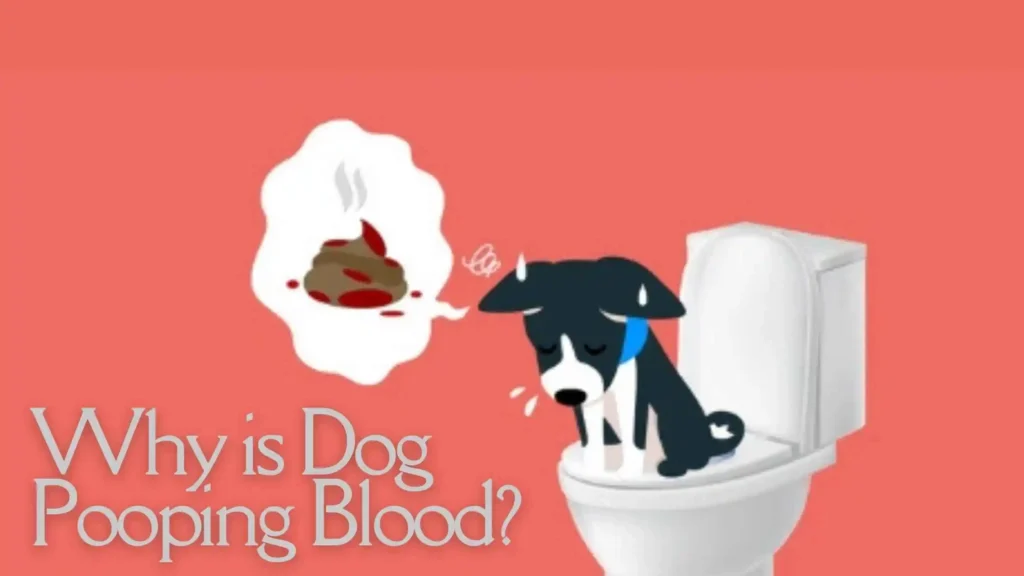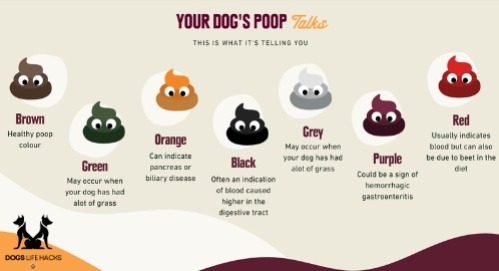Why Is My Dog Pooping Blood? Warning Signs Shouldn’t Ignore!
“My dog pooping blood” can be a very panicky situation for any strategy dog owner to deal with. This is the time to be cautious concerning your dog’s health because it poses a threat to your dog’s life.
Black or red-colored stools in dogs are called hematochezia and it can lead to various allied health risks and may require immediate medical attention and treatment.
In this article, all about the “Why is my Dog Pooping Blood?” question will be addressed.

Importance of Immediate Attention
It’s very important to monitor your pet’s health. Delaying in diagnosis and treatment can be dangerous and can cause more diseases. Immediate attention can give relief and comfort to your dog and stop any life-threatening situations.
Common Causes of Blood in Dog Stool
Gastrointestinal Infections
One of the most common causes of dog pooping blood is gastrointestinal infections. The inflammation and bleeding are caused by fungal, bacterial, and viral infections. The infection can damage the lining of the intestines. Major culprits include Escherichia coli, Salmonella, and Parvovirus.
Parasitic Infections
Parasites can also cause bloody stool in dogs. Parasites such as hookworms, whipworms, and roundworms latch onto the intestinal walls of dogs, causing infection and bleeding. Time to time deworming and fecal tests are compulsory for preventing and diagnosing parasitic infections.
Dietary Indiscretions
Dogs do not have a sense of what to eat and what not to eat. Dogs like to eat spoiled food, garbage, or non-food items, which can upset their digestive system, leading to inflammation and bleeding. Always feed clean, fresh food and water to your dogs.
Ingestion of Foreign Objects
Consuming foreign objects like toys, bones, or other non-digestible items can cause congestion and create wounds in the intestines. This bloody situation requires immediate veterinary consultation.

Symptoms of Dog Pooping Blood
Changes in Stool Consistency and Color
Blood in the stool can be of a different color. It varies from bright red to dark brownish red. In any case of a dog pooping blood, visit the vet immediately.
Other Physical Symptoms
Vomiting, loss of appetite, lethargy, or abdominal pain can be symptoms of blood in stool.
Behavioral Changes
Behavioral changes occur due to infections and pain. This can cause increased irritability, reluctance to move, or signs of discomfort. In this situation consult a vet.

Serious Underlying Conditions
Cancer
Gastrointestinal cancers such as lymphoma or adenocarcinoma, can cause blood in the stool. These serious conditions require surgery, chemotherapy, or radiation therapy.
Inflammatory Bowel Disease (IBD)
This condition is due to inflammation of the intestines. This results in diarrhea, vomiting, and blood in the stool. IBD can be managed by changing diets, medical support, and veterinary care.
Hemorrhagic Gastroenteritis (HGE)
HGE is sudden and severe diarrhea with blood. Major causes of HGE are stress, bad diet, and bacterial infection. This condition can lead to hospitalization for fluid therapy and monitoring.
Coagulopathies (Blood Clotting Disorders)
This condition can cause both internal and external bleeding. If not treated in starting phase it can cause hemophilia or thrombocytopenia (low platelet count).
Diagnosing the Issue
Veterinary Examination
A proper veterinary examination is crucial in diagnosis. The vet will examine the previous health records of the dog and perform a physical test of the stool to look for causes of illness.
Laboratory Tests
Lab tests like blood work and fecal analysis can help in diagnosing the illness. These tests are important for finding the exact cause of bleeding.
Imaging Studies
X-rays and ultrasounds can provide an internal picture of illness and damages caused by illness. Internal imaging detects foreign objects, tumors, and other structural issues causing bleeding in dogs.

Treatment Options
Medications
Always consult your vet before any medication. The vet may prescribe medications such as antibiotics, anti-parasitics, anti-inflammatories, or clotting agents.
Dietary Changes
For gastrointestinal issues, a good diet is very crucial. Ask your vet for a special diet plan to counter inflammation and promote healing. In severe cases, a hypoallergenic or prescription diet might be necessary.
Surgery
Serious cases of HGE, foreign object ingestion, and tumors may require surgery to remove obstructions and repair damage to address any underlying issues.
Home Care and Monitoring
At-Home Treatments
On mild symptoms, home remedies and treatments can help you in the recovery of your dog. This includes providing a good and balanced diet, keeping your pet hydrated, and following the instructions of your vet.
Monitoring Your Dog’s Health
To keep your dog healthy monitor its stool, diet, and any symptoms of illness. Make a routine monitoring chart and share it with your vet for professional guidance.
Diet for Dog Pooping Blood
The best idea is to consult your vet for a diet plan. The homemade best-advised meal is plain, cooked white rice and boiled, skinless chicken or another lean protein source. Avoid any kind of seasonings or spices, and always keep your dog hydrated.
Preventative Measures
Regular Vet Check-Ups
Regular check-ups can help you to maintain your dog’s health. You can counter any disease or negative signs in the early stages with routine examinations.
Proper Diet and Nutrition
A proper diet is the perfect source of a healthy dog. You can keep your dog away from many issues and diseases only by proper and timely diet. Junk food can create many problems and can upset their digestive system.
Safe Environment
Make sure that the surroundings of your dog are safe and hazard-free. Keep harmful things away and provide appropriate germ-free toys to play with. Monitor them to prevent them from ingesting foreign objects.
When to Visit the Vet Immediately For Dogs
Emergency Symptoms
If your dog is suffering from severe vomiting, rapid weight loss, extreme lethargy, or profuse bleeding, go to your vet immediately. Because these symptoms are very serious and require quick attention.
What to Expect at the Vet
In this alarming situation, after a thorough examination vet may ask for tests on your dog. Further treatment will depend on test results and might be hospitalization, intravenous fluids, or surgery.
Understanding Prognosis
Recovery Expectations
The recovery time for a dog pooping blood depends on the disease or infection it is suffering. Some conditions are cured only by mild medication and care. In serious cases, your vet will tell you the exact picture and time.
Long-Term Management
If your dog is suffering from IBD or blood clotting disorder, then it will take time to recover. This will include proper medication, a balanced diet, and regular veterinary check-ups.
Common Misconceptions About Dod Pooping Blood
Myths About Dog Pooping Blood
There are many myths about dog pooping blood. The top myth is that it is because of cancer. Whereas, it can be because of illness. Many other treatable symptoms and conditions can also cause blood in a dog’s stool.
Truths You Should Know About Dog Pooping Blood
Knowing the truth and real cause of dog pooping blood can help in early detection and avoid unnecessary worry about a pet’s life. This will help cure and ensure your dog’s health and well-being.
Conclusion
Dog pooping blood is a serious concern and needs to be managed immediately. Understanding the root cause, symptoms, and timely treatment can help you save your dog’s life. Before adding something new to your dog’s diet or any medication, always consult your vet for the best professional advice.
FAQs
What does it mean if a dog poops blood?
Blood in a dog’s stool is due to a disease called hematochezia and it can cause various health complications and need urgent care and cure. Blood in the stool can be of a different color. It varies from bright red to dark brownish red. In any case of a dog pooping blood, visit the vet immediately.
Is bloody stool in dogs an emergency?
If your dog pooping blood and is suffering from severe vomiting, rapid weight loss, extreme lethargy, or profuse bleeding, go to your vet immediately. Because these symptoms are very serious and require quick attention.
Can I treat my dog’s bloody stool at home?
On mild symptoms, home remedies and treatments can help you in the recovery of your dog. This includes providing a good and balanced diet, keeping your pet hydrated, and following the instructions of your vet.
What to feed a dog with bloody stool?
Feed as light as you can to help your dog recover quickly. The best meal in this situation is plain-cooked white rice with a little chicken and some canned plain pumpkin.
Can dogs poop blood from stress?
Yes, stress causes large bowel diarrhea in dogs which leads to inflammation and blood in stool.
More You Want To Know About Dogs
- Top Secret Eggshells For Dogs To Transform Your Dog’s Diet
- Top 5 Best Fish for Dogs – Best Choices for a Healthy Pet
- World’s First Airline for Dogs Fly First Class with BARK Air
- Causes of Dog Shaking Head | Symptoms, and Treatment Guide
- Best Fish Oil Dosage Calculator for Dogs: Dog’s Health Guide
- Are Chicken Feet Good for Dogs? Benefits and Safety Tips
- Can Dogs Eat Goji Berries? Benefits, Risks & Best Food Tips
- Healthy Beef Jerky for Dogs – Yummy Guide for Happy Pups!
𝓜𝓪𝔂 𝓨𝓸𝓾𝓻 𝓟𝓮𝓽𝓼 𝓢𝓽𝓪𝔂 𝓗𝓮𝓪𝓵𝓽𝓱𝔂 🙂

5 Comments